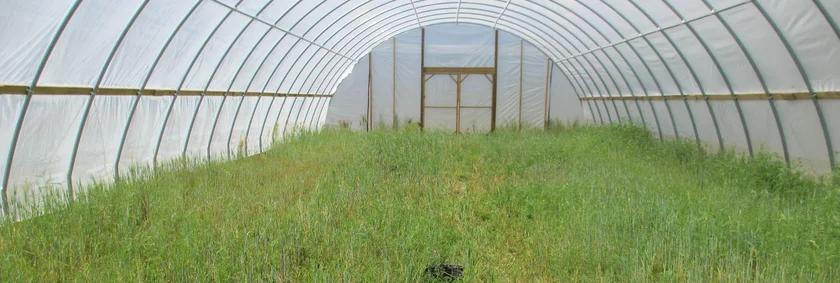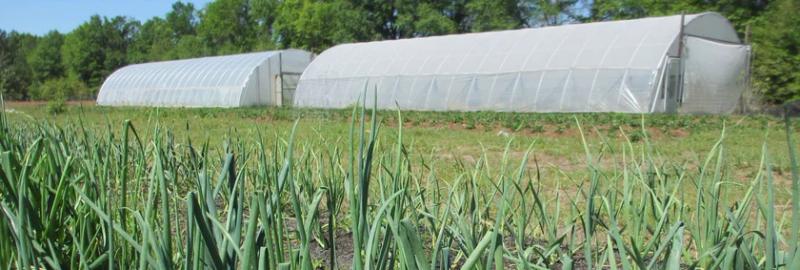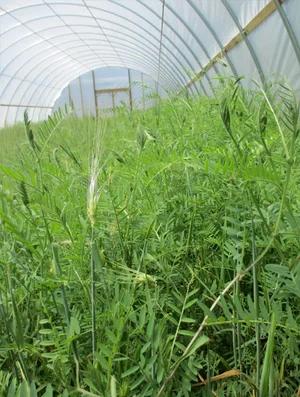Cover crops have surprising benefits in high tunnels


It was an unusual sight: Barley and hairy vetch growing vigorously in a high tunnel at Lola’s Organic Farm in southeast Georgia were going to seed. It was mid-April. Time to mow and prepare the soil for the summer’s cash crops: ginger
and turmeric.
Since last year, couple Jennifer Taylor and Ron Gilmore—USDA certified organic farmers—have been playing around with growing cover crops in high tunnels. They had read about positive results of a Southern Sustainable Agriculture Research & Education (SSARE)-funded Producer Grant project that showed cover crops grown in the field ahead of a cash crop can suppress weeds and build soil health.
They wanted to see if incorporating cover crops in high tunnels produced the same results. So far, the answer is yes.
“In fact, the effects of cover crops in a high tunnel are much better than what we even found in the field,” said Gilmore. “Cover crops hold moisture a lot longer in the soil and weed management is a lot better with cover crops used as compost in high tunnels.”

High tunnel management
The couple have two high tunnels on their 32.5 acre farm, obtained through the NRCS High Tunnel System Initiative. Barley and hairy vetch were targeted in one high tunnel because they both fix nitrogen in the soil, and Jennifer read that barley also uptakes heavy metals (copper, cadmium, zinc), as well as salt, which can accumulate to toxic levels in high tunnels.
The second high tunnel was dominated by iron clay pea last season—planted to build soil organic matter and resist root-knot nematode, a local problem. The soil was prepared to plant yellow mustard, a cover crop known to build soil organic matter, as well as control soil-borne pathogens. This is a sustainable ag practice known as biofumigation. In addition, yellow mustard will serve as a short-rotation cash crop.
Big, bad bermudagrass

The couple’s interest in cover crops may have not been realized save for an on-farm problem called bermudagrass. “It just kept choking the life out of our plants,” said Gilmore.
In the 2015 SSARE Producer Grant study (FS13-267), “Mechanical and Biological Strategies to Remove Invasive Bermudagrass in Preparation for Organic Vegetable Production on Raised Beds,” the couple evaluated two non-chemical strategies to control and manage heavy bermudagrass infestations: cover crops and mechanical methods.
Results showed that vigorous weeds can be suppressed by using integrated, intensive cover crop management strategies. “The cover crop strategy seemed to build healthy soil while suppressing weeds and increasing cash crop yields,” said Taylor.
Taylor and Gilmore were convinced. Today, no cash crop is produced on Lola’s Organic Farm without some type of cover crop incorporated into the soil first.
About Lola’s Organic Farm

Lola’s Organic Farm is a multi-generational family farm, named after Jennifer Taylor’s grandmother, who farmed the land as a sharecropper. She produced a wide variety of vegetables and fruit crops, and raised turkeys, ducks and dairy cattle. Jennifer Taylor and Ron Gilmore are in their eighth year as USDA-certified organic farmers.
“That’s the fine line farmers walk when it comes to using cover crops. We don’t want to sacrifice soil with cover crops if we can’t make cash off it,” said Gilmore. But the couple does see the benefits of using cover crops on their farm beyond the dollars and cents. Cover crops provide a solution to weed, pest, and soil management challenges inherent to an organic farm.
Cover crops have now become an integral part of Lola’s Organic Farm crop production: subterranean clover covers the ground around muscadine vines; a barley/hairy vetch/subterranean clover mix is being planted ahead of organic peanuts; and pigeon pea is planned for new land currently being cleared for production. All of these fix nitrogen, choke out weeds, and improve soil health.
Tags:Garden & Landscape

Acreage Life is part of the Catalyst Communications Network publication family.
















